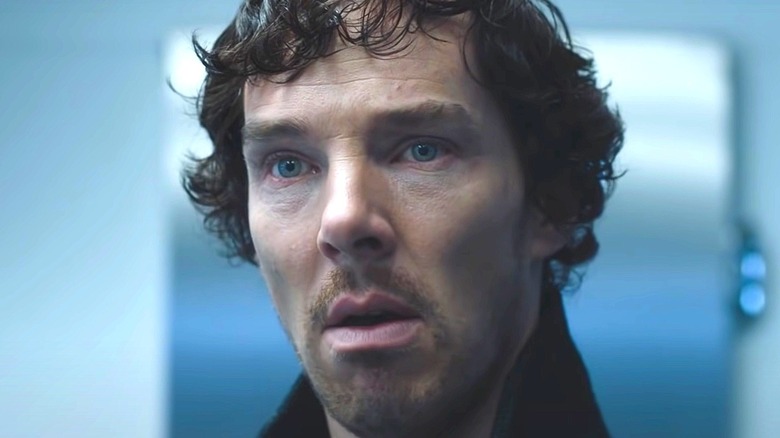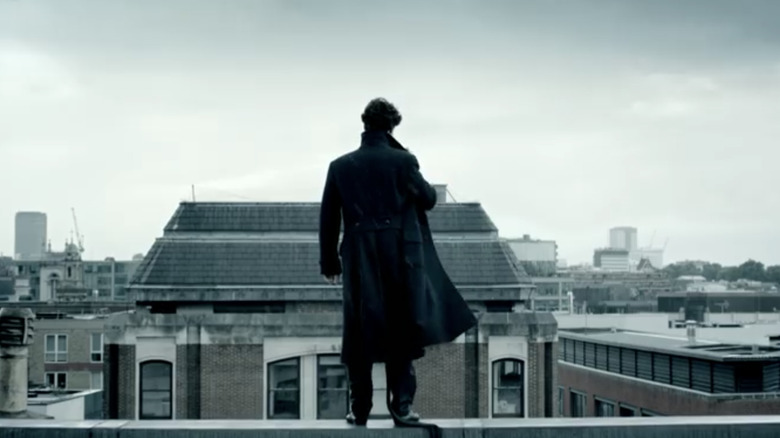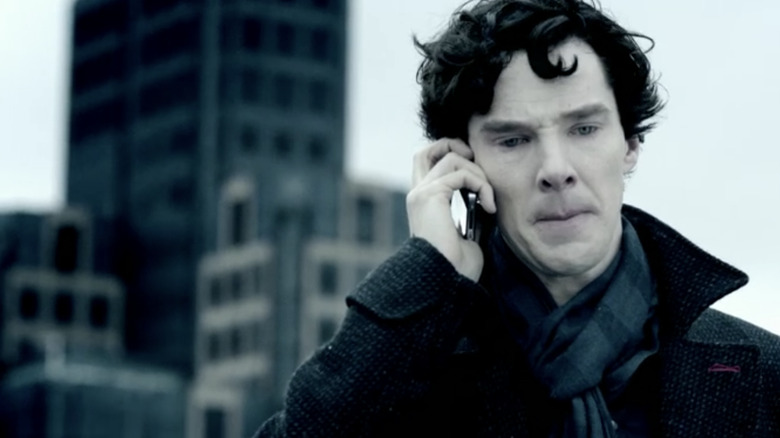Why Sherlock's The Reichenbach Fall Was A Double-Edged Sword For The Show
Looking back, it's incredible to consider just how popular BBC's "Sherlock" was at its peak. The series is a modern retelling of the classic Sherlock Holmes detective stories, with Benedict Cumberbatch starring as the show's titular cap-wearing detective and Martin Freeman playing his right-hand-man, Dr. John Watson.
"Sherlock" was a cultural phenomenon in its heyday: by the time it reached Season 3, the show was pulling in an average of 11.82 million viewers per episode and became BBC's most-watched drama series in the U.K. since 2001 (via RadioTimes). The show made Benedict Cumberbatch a household name, and its first three seasons are to this day revered as some of the best detective dramas ever written (and indeed, some of the best live-action Sherlock Holmes adaptations ever created).
Unfortunately, the show faded into relative obscurity following the release of its controversial and critically-panned 4th season (currently holds a meager 54% on Rotten Tomatoes), which sent the series into an indefinite hiatus. At first glance, it seems easy to blame the show's demise on Season 4 alone, though it can be argued that the show's downfall truly began all the way back in the Season 2 finale, "The Reichenbach Fall."
The Reichenbach Fall was Sherlock's greatest moment, and may have set the series up for failure
"The Reichenbach Fall" saw the eccentric Sherlock Holmes going toe-to-toe with his rival James Moriarty (Andrew Scott) –- and losing. Moriarty outplays the world's greatest detective and forces him to choose: either he dies by suicide, or all of his friends die at the hands of hired assassins. Sherlock appears to accept the inevitable, and leaps from the top of a building right in front of Dr. Watson, appearing to die a gruesome, bloody death. Watson is utterly traumatized by the whole ordeal, leading up to the final moment of the episode where he tearfully says his goodbyes at Sherlock's grave, while a very much alive Sherlock Holmes watches him from behind a tree.
In a cliffhanger to end all cliffhangers, it was revealed that Sherlock was (impossibly) alive, and the internet went mad with theories and questions about how he could have possibly survived. The episode was (and still is) the crowning achievement of the entire series, inspiring an entire social media movement devoted to theorizing about Sherlock's death, and holds an incredible 100% on Rotten Tomatoes to this day.
Looking back, it seems inevitable that the series could never have lived up to the hype following "The Reichenbach Fall," though it's still unfortunate that they chose to explain Sherlock's survival in such a convoluted way.
The show was never able to live up to The Reichenbach Fall again
Season 3's first episode gave fans the reunion they had all been waiting for, as Watson discovered at last that his friend Sherlock Holmes was alive, though the episode is purposely ambiguous about how exactly he survived. We're given three separate scenarios, two from a crazed Sherlock theorist named Philip Anderson (Jonathan Aris). Sherlock himself visits Anderson later in the episode to explain exactly how he did it, but it's implied that this version is just a figment of Anderson's imagination, as he disappears abruptly while the two are chatting.
It's almost like the showrunners realized they could never have made up an explanation to please everybody, so they provided no explanation at all. Not only do they fail to explain Sherlock's survival, but throughout the rest of the series, they constantly tried to one-up that cliffhanger with scenes that offered similar shock value. John's wife Mary (Amanda Abbington) is revealed to be a deadly assassin, Moriarty returns from the dead, and 221 Baker Street is blown to pieces in a fiery explosion.
The shadow of "The Reichenbach Fall" still hangs over the series all these years later, as its cliffhanger was never truly resolved, and the show has failed time and time again to reproduce its impact no matter how hard they try, resulting in a 4th season that is so convoluted and messy it hardly seems like the same show at all.


